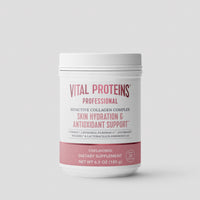Depending on your diet, it can seem really hard to get the recommended amount of protein each day. The exact amount of protein needed per day varies by person, sex and activity level, but it usually works out to somewhere between 40-55g per day for women, and 50-65g for men. This may not sound like a lot, but 50g is the equivalent of eating almost eight and a half eggs per day (not recommending that, just saying). It makes sense that people would turn to protein powder recipes to help them reach their goals. But what is protein powder, and do you really need it?

What Is Protein Powder?
“Protein powder is a nutrition supplement that can increase the protein content of a diet, “ Ilyse Schapiro, RD, tells Lively. “Protein powder is recommended for people who are not able to meet their protein or energy requirements. It's a great addition for athletes or vegans/vegetarians,” she adds. It may be tempting, especially when protein powders often come in sweet flavors like chocolate or even birthday cake, to add a scoop of powder to your smoothie in the morning, or grab a protein bar on the go, but it’s still best to get your protein from food whenever possible.
“Whole foods are always the best choice. Meeting protein requirements is not hard ...” Schapiro says. She adds that high protein foods include eggs, chicken, red meat, cottage cheese, Greek yogurt, fish, shellfish, lentils, beans, turkey, nuts, nut butters and soy foods.

To find out how much your recommended daily allowance (RDA) of protein is, it usually works out to about .36g per pound, so a 140-lb. woman would need about 50g per day. For context, a 4-oz. beef burger has about 20g of protein, and the same amount of chicken actually has more protein, about 32g. The jury is mixed on this, but some say that most people are eating enough, if not too much, protein. “I think protein intake should follow the recommended daily guidelines for each individual specifically. I don’t believe in over-doing anything. It all depends on the health state of the body and the goals one wants to achieve,” Anita Mirchandani, RD, tells Lively.
what is whey protein?
More scientifically speaking, “whey is the watery portion of milk and is a byproduct of cheese-making,” Ilyse Schaprio, RD, tells Lively. Milk products consist of two proteins: casein and whey, both of which can be dried and powdered (the curds from casein can be added to cottage cheese).
"Whey protein is a mixture of proteins isolated from the whey. It contains all essential amino acids," Schapiro says. There are 20 amino acids needed by your body for optimal function, and nine of those, including the three Branch Chain Amino Acids (BCAAs), are known as “essential amino acids." Whey is known as a “complete protein” precisely because it has all nine essential acids.
What Does Protein Powder Do?
Getting an adequate amount of protein is essential and not just because it puts you on the fast track to building muscle. Protein helps to repair tissue and is a building block of healthy bones, muscle, skin, cartilage and even blood. Protein powder can be helpful for people who are “athletes, growing young adults who are also athletes, those recovering from surgery, vegan diet followers,” and otherswho may not meet their daily needs through food alone, Mirchandani says.

What Is The Best Protein Powder?
The best protein powder will depend on your individual flavor preferences, but generally “whey protein and pea protein are good choices as they contain all essential amino acids naturally,” Schapiro says. Pea protein has a high content of lysine (an important amino acid that our bodies do not make naturally) while being low in methionine, which in high doses is associated with inflammation. So, what is whey protein? Schapiro adds that whey protein, which is made from the watery liquid created as a by-product of cheese production, also “has the branched chain amino acids (BCAAs) that are believed to increase muscle synthesis.” Pea protein is allergy-friendly and a good option for someone looking to avoid animal or soy products. An important note: Always buy from a reputable brand as Schapiro notes some protein powders have been shown to be contaminated with heavy metals that the body does not need in high amounts.
Related Articles
Vital note: This article has been made available for informational and educational purposes only. It is not intended to be a substitute for professional medical advice, diagnosis, or treatment. Always seek the advice of your physician or another qualified health provider with any questions you may have regarding a medical condition. Your licensed healthcare professional can best provide you with the diagnosis and treatment of any medical condition and assist you as well in deciding whether a dietary supplement will be a helpful addition to your regimen.













